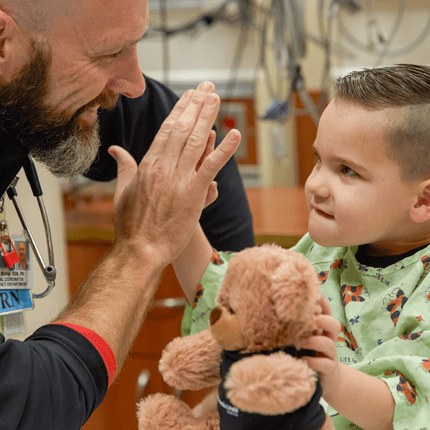

Hematology Oncology Services and Innovations

Below is a summary of some of the unique services and specialty clinics offered for pediatric, adolescents and young adult (AYA) populations, including following cancer survivorship of adult survivors of childhood cancer, through the Hematology Oncology Program at the Children’s Hospital of Michigan.
Advanced Diagnostics
The Pediatric Hematology Oncology program at the Children’s Hospital of Michigan provides advanced diagnostic evaluation – including MR spectroscopy and Positron Emission Tomography (PET) scans – for children with cancer.
Bone Marrow Transplants
In 2007, the Children's Hospital of Michigan opened the region's only pediatric bone marrow transplant unit. The advanced unit includes private rooms equipped with cutting edge monitoring equipment and a HEPA filtration system to ensure the environment is highly protective against infection, a major complication for patients undergoing bone marrow transplants, and cutting-edge monitoring equipment.
The Division of Hematology/Oncology’s Bone Marrow Transplant team at the Children’s Hospital of Michigan, in partnership with the Barbara Ann Karmanos Cancer Institute, provides expert care to children during allogeneic, autologous, peripheral stem cell and cord blood transplants. A dedicated bone marrow/stem cell transplant unit is offered for patients requiring hospitalization. Pre- and post-transplantation medical and psychosocial support services are also available.
Cancer Survivorship Program
According to the National Cancer Institute, as of 2014, more than 400,000 cancer survivors were first diagnosed when they were under the age of 20. Advances in cancer treatment mean that today more than 80 percent of children diagnosed with cancer are alive at least five years after diagnosis.
Thanks to advances in treatment and follow-up care, more kids than ever are not only surviving their brush with the disease, they’re going on to enjoy active lifestyles in which the "late effects" of cancer are effectively managed and allowing them to pursue demanding careers and raise children of their own.
In order to meet the needs of these patients, DMC Children’s Hospital of Michigan offers a Childhood Cancer Survivorship Program, for survivors of childhood cancer to receive the vital follow-up care they need for continued health, far down into adulthood.

Click to watch footage from our latest Cancer Survivor's Day celebration
Celebration of Life
For more than two decades, childhood cancer survivors at the Children’s Hospital of Michigan along with their friends and families gather yearly for the Children's Hospital of Michigan Celebration of Life Program. This incredible, heartwarming event is organized by the Children’s Hospital of Michigan Hematology Oncology Department to celebrate childhood cancer survivors treated at the Children's Hospital of Michigan.
Hemophilia and Other Pediatric Blood Diseases Program
The Children’s Hospital of Michigan is internationally recognized as an innovator in the care of pediatric and young adult patients with hemophilia, hemostasis thrombosis and other blood diseases. Clinical trials provide patients with the latest treatment modalities and in-depth surveillance of complications. The division operates a coagulation laboratory, which provides great flexibility in making a diagnosis, devising new coagulation tests, and conducting studies of new innovative therapies. The division also provides complete diagnostic testing, carrier detection and genetic counseling, hepatitis testing, radionucleotide (nonsurgical) isotope synovectomy and immune tolerance programs for inhibitors. Family education, support groups and education about home care options are also available for pediatric patients with bleeding disorders.
McKenna's Squad Beauty Bar Opens at the Children's Hospital of Michigan
The legacy of McKenna Schummer will live on after the opening of McKenna's Beauty Bar at the Children's Hospital of Michigan. McKenna fought bone cancer for the better part of two years through the Children’s Hospital of Michigan Hematology Oncology Department. During that time she developed a passion for makeup and wanted other children in the hospital to experience the same joy.
Specialty Clinics
Cancer Genetics Clinic
Board certified pediatric geneticists, pediatric oncologists and genetics counselors evaluate patients at the Children’s Hospital of Michigan to determine if there is a hereditary/genetic basis for developing cancer. This is available for patients with cancer that have a known strong hereditary pattern (e.g. retinoblastoma) or a family history to suggest a hereditary cancer predisposition syndrome (e.g. Li Fraumeni syndrome).
Neuro-oncology Clinic
This multidisciplinary clinic provides ongoing follow up care to survivors of childhood/pediatric brain tumors to monitor for sequelae (late effects from their therapies). The medical team consists of pediatric oncologists, pediatric endocrinologists, pediatric neurologists, pediatric radiologists, pediatric neurosurgeons, pediatric radiation oncologists, nurses and social workers to ensure a high quality of life for survivors.
Sickle Cell Center
The Sickle Cell Center at the Children's Hospital of Michigan DMC has a long history of providing multidisciplinary care for sickle cell patients as well as a public education program to help identify carriers of the sickle cell gene and infants who have the disease at birth. The center also offers a Newborn Sickle Cell Screening Program.
Thrombosis Clinic
Children’s Hospital of Michigan is receiving national and international recognition for its research into pediatric thrombosis – a condition that is increasing in children and is often missed or misdiagnosed. Researchers are collaborating nationally in clinical trials to develop anticoagulation drug dosing guidelines for children with blood clots. Researchers are also learning that children who have a central venous catheter are most likely to develop a clot.
In addition to this research, the Thrombosis Clinic at the Children’s Hospital of Michigan proactively works with other physicians and nurses in the hospital to identify patients who are most likely to develop a clot. Physicians then follow patients closely and monitor them for signs of a clot and side effects of therapy.
Oncology Services
Find a Pediatric Hematologist Oncologist
Find a Pediatric Hematologist Oncologist
"This is a dialog window which overlays the main content of the page and plays an embedded YouTube video. Pressing the Close Modal button at the bottom of the modal or pressing the Escape key will close the modal and bring you back to where you were on the page.

